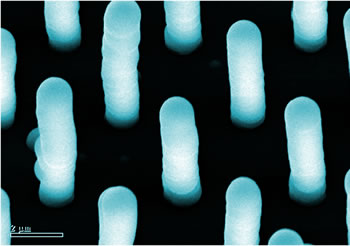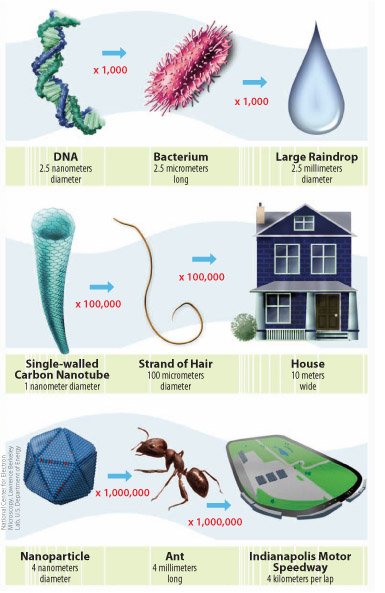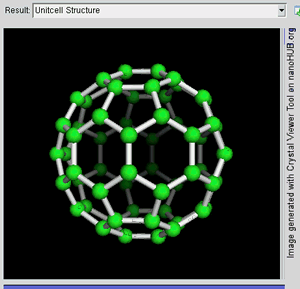What is Nanotechnology?

Nanotechnology is a broad term that covers many areas of science, research and technology. In its most basic form, it can be described as working with things that are small. Things so tiny that they can't be seen with standard microscopes. The same stuff that has always been there, but we just couldn't see it. The building blocks of nature, atoms and molecules. Nano-technology involves understanding matter at the "nano" scale.

Size Matters
This illustration from nano.govgives visual examples of the size and the scale of nanotechnology, showing us just how small nanotechnology actually is.
A nanometer is one-billionth of a meter. In comparison, a human hair is about 100,000 nanometers in diameter.
All dimensions are approximate. Nanoparticle is courtesy of the National Center for Electron Microscopy, Lawrence Berkeley Lab, US Department of Energy.
Another illustration of size comparison can be found here:
"The scale of things"
"The scale of things"

Buckyballs and Nanotubes
A fullerene is any molecule composed entirely of carbon, in the form of a hollow sphere, ellipsoid, or tube. Spherical fullerenes are also called buckyballs, and cylindrical ones are called carbon nanotubes or buckytubes.
Because of their unique properties, nanotubes and buckyballs open a path to many futuristic applications. Because of their size, they pose a risk to human health.
Image of Rotating crystal structure of C60 (Buckminister Fullerene). courtesy of Wikimedia Commons
How is nanotechnology being used today?
Nanotechnology is being used to make surfaces self-cleaning and stay clean for a long time. Nanotech can be found in cosmetics, sunscreens, clothing and many other consumer products today.
Types of Nanomaterials
- Carbon Nanotubes
Fullerenes and Buckyballs
Dendrimers
Fine and Ultrafine Particulates in Air
Quantum Dots and Nanocrystals
Titanium Dioxide nanoparticles
Silver nanoparticles
Silver nanowire
Other nano-sized particles
Nanobots
Nanobots do not exist yet, but when they do, futurists predict possible uses for nanorobots will include molecular manufacturing (nanofactories) and medical nanobots that steer autonomously through your blood stream making repairs and guarding against infection.
No comments:
Post a Comment